| 1. The History of Arab-Jewish conflict 1881-1948 / PJ Vincent .- Delhi: |
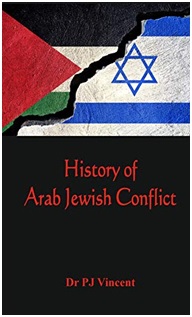 Abstract:The emergence of the modern Zionist Movement was driven by the search for a homeland in Palestine for the stateless and persecuted Jewish People. The organized migration and settlement of Jewish people under the banner of the World Zionist Organization trampled the fundamental rights of Palestine People and continuously rejected their statehood. The rejectionist policy practiced by Zionists and the State of Israel explains the persistence of the Palestine question. This book devotes to examine the historical origin and evolution of Arab-Israeli conflict from 1881, the year of first Aliya, to the creation of the state of Israel in 1948. It investigates socio-political and cultural aspects of the conflict with an emphasis on the historical factors. Abstract:The emergence of the modern Zionist Movement was driven by the search for a homeland in Palestine for the stateless and persecuted Jewish People. The organized migration and settlement of Jewish people under the banner of the World Zionist Organization trampled the fundamental rights of Palestine People and continuously rejected their statehood. The rejectionist policy practiced by Zionists and the State of Israel explains the persistence of the Palestine question. This book devotes to examine the historical origin and evolution of Arab-Israeli conflict from 1881, the year of first Aliya, to the creation of the state of Israel in 1948. It investigates socio-political and cultural aspects of the conflict with an emphasis on the historical factors. |
| 2. India's India's national security; a maritime security perspective / Sures. .- Delhi: Vij Books India Pvt Ltd., 2020 |
 Abstract:Maritime security is one of the latest additions to the field of international as well as national security. The concept has received growing attention especially due to the intensification of concerns over maritime terrorism since 2000. The rise of modern piracy, maritime crimes such as human trafficking, and the increasing importance of the 'blue economy'and issues relating to freedom of navigation, maritime environmental protection and resource management have resulted in increased significance of maritime security studies. A significant number of states and other international actors such as, Multinational Corporations (MNCs) and Transnational Corporations (TNCs), have placed maritime security high in their security agenda. Abstract:Maritime security is one of the latest additions to the field of international as well as national security. The concept has received growing attention especially due to the intensification of concerns over maritime terrorism since 2000. The rise of modern piracy, maritime crimes such as human trafficking, and the increasing importance of the 'blue economy'and issues relating to freedom of navigation, maritime environmental protection and resource management have resulted in increased significance of maritime security studies. A significant number of states and other international actors such as, Multinational Corporations (MNCs) and Transnational Corporations (TNCs), have placed maritime security high in their security agenda. |
| 3. Islamic movements in the middle east; ideologies, practices and political paricipation / P R Kumaraswamy , Md. Muddassir Quamar and Manjari Singh . |
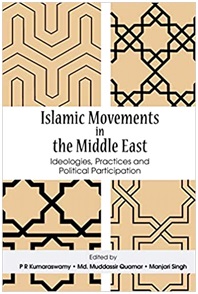 Abstract:Islam is integral to the societies in the Middle East. It is part of people’s faith, cultural expressions, and social constructions, and a source of law and political legitimacy. In modern times, Islam re-emerged as a significant tool for political mobilisation and in the wake of the Arab Spring these movements have become more popular and have expanded their political space in the whole region. Islamic Movements in the Middle East traces their origin, evolution, ideologies, practices, and analyses their political participation. It is an effort to provide an Indian understanding of Islamic movements in the Middle East Abstract:Islam is integral to the societies in the Middle East. It is part of people’s faith, cultural expressions, and social constructions, and a source of law and political legitimacy. In modern times, Islam re-emerged as a significant tool for political mobilisation and in the wake of the Arab Spring these movements have become more popular and have expanded their political space in the whole region. Islamic Movements in the Middle East traces their origin, evolution, ideologies, practices, and analyses their political participation. It is an effort to provide an Indian understanding of Islamic movements in the Middle East |
| 4. Massive plunder of Afghanistan's Mineral wealth; the US and NATO burglars, taliba, islamic state of kashmir, and ..... / Musa Khan Jalalzai .- Delhi |
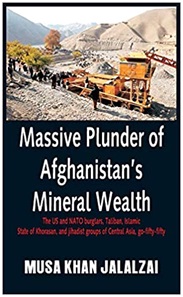 Abstract:The Looting and ransacking of Afghanistan's natural resources by criminal militias; such as the ISIS terrorist group, and Taliban caused misunderstanding between the Afghans and International Coalition that they all are involved in the looting of mineral resources of their country. The Islamic State of Khorasan controls a large amount of territory in Afghanistan, and that includes parts of the country's rich mineral wealth, especially talc, chromite, and marble. According to the Global Witness research report, several insurgents' groups, militias, Taliban and ISIS are deeply involved in the plunder of these resources. These are the aspects discussed in the book by prominent authors. Abstract:The Looting and ransacking of Afghanistan's natural resources by criminal militias; such as the ISIS terrorist group, and Taliban caused misunderstanding between the Afghans and International Coalition that they all are involved in the looting of mineral resources of their country. The Islamic State of Khorasan controls a large amount of territory in Afghanistan, and that includes parts of the country's rich mineral wealth, especially talc, chromite, and marble. According to the Global Witness research report, several insurgents' groups, militias, Taliban and ISIS are deeply involved in the plunder of these resources. These are the aspects discussed in the book by prominent authors. |
| 5. Military strategy; for Indian in the 21st century / AK Singh and BS Nagal .- New Delhi: KW Publishers, 2019 |
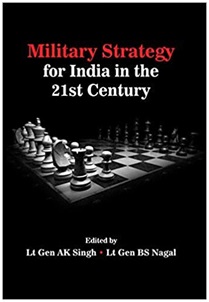 Abstract:Military Strategy for India in the 21st Century is a comprehensive collection of high value essays defining multiple nuances of military strategy. Written by prominent military and civilian experts on essential aspects of national and military strategy, the book reflects on the need to deal with existing and potential security threats and challenges, as well as achievement of national goals and aspirations, in which the military has a role to play. The essays provide an intellectual inquisitiveness to enrich the evolving domain of strategic thinking in India. Quintessentially the collection is a value addition to the emerging field of professional military education in the Indian context. Abstract:Military Strategy for India in the 21st Century is a comprehensive collection of high value essays defining multiple nuances of military strategy. Written by prominent military and civilian experts on essential aspects of national and military strategy, the book reflects on the need to deal with existing and potential security threats and challenges, as well as achievement of national goals and aspirations, in which the military has a role to play. The essays provide an intellectual inquisitiveness to enrich the evolving domain of strategic thinking in India. Quintessentially the collection is a value addition to the emerging field of professional military education in the Indian context. |
| 6. National security perspectives; A critical anthology of writings by gautam sen / Gurmeet Kanwal .- New Delhi: KWPublishers, 2019 |
 Abstract:P.S. Raghavan, Chairman, National Security Advisory Board Abstract:P.S. Raghavan, Chairman, National Security Advisory Board
Professor Gautam Sen is one of the unsung high thinkers on security policy and strategic affairs in India. His recent work provides an Indian perspective on national and international Security Policy Making and has been ably and sensitively edited by Brigadier Gurmeet Kanwal. This volume is a must read for students and practitioners.
Dr. Onkar Marwah, IAS and a Distinguished Fellow at IPCS , New Delhi |
| 7. Pakistan and the Muslim world / Mathew Joseph C. .- New Delhi: KW Publishers Pvt Ltd, 2019 |
 Abstract:Pakistan and the Muslim World is the outcome of an international seminar organised by the UGC-Centre for Pakistan Studies at the MMAJ Academy of International Studies, Jamia Millia Islamia, New Delhi. Unlike other Muslim countries, Pakistan came into being in the name of Islam and Muslim nationalism. The Arab world also witnessed the emergence of nationalism in the 20th century. However, the thrust of Arab nationalism was different from that of Muslim nationalism and the Two Nation Theory which were the basis of the formation of Pakistan. While Arab nationalism was imagined as an idea anchored around Arabic language and secularism, Muslim nationalism and the Two Nation Theory were based on Islam and the distinctiveness between Hindus and Muslims. Despite this cardinal difference, the changes that have been taken place in the Muslim world over the years always impacted upon the politico-economic and socio-cultural realms of Pakistan. The book tries to locate Pakistan in the larger context of the Muslim World both politically and ideologically. Abstract:Pakistan and the Muslim World is the outcome of an international seminar organised by the UGC-Centre for Pakistan Studies at the MMAJ Academy of International Studies, Jamia Millia Islamia, New Delhi. Unlike other Muslim countries, Pakistan came into being in the name of Islam and Muslim nationalism. The Arab world also witnessed the emergence of nationalism in the 20th century. However, the thrust of Arab nationalism was different from that of Muslim nationalism and the Two Nation Theory which were the basis of the formation of Pakistan. While Arab nationalism was imagined as an idea anchored around Arabic language and secularism, Muslim nationalism and the Two Nation Theory were based on Islam and the distinctiveness between Hindus and Muslims. Despite this cardinal difference, the changes that have been taken place in the Muslim world over the years always impacted upon the politico-economic and socio-cultural realms of Pakistan. The book tries to locate Pakistan in the larger context of the Muslim World both politically and ideologically. |
| 8. Post revolutionary Iran's state behaviour; towards India, Pakistan and China / Sima Baidya .- New Delhi: KW Publishers Pvt Ltd, 2019 |
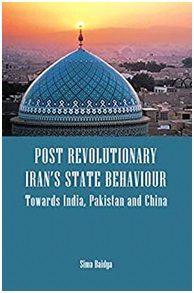 Abstract:The book dissects Iran’s state behaviour. Narrowing it down to issue area approach, it lays emphasis on the discourse of state behaviour and how it negotiates and re-negotiates with different actors and circumstances alike. Factored in the pre-conceived notion of differentiation between foreign policy and state behaviour, this book examines the overlapping character of the two, its tendency to merge in a low and high intensity scenario; nonetheless posturing it differently at a different point of time. This is done by taking the case study of Islamic Republic of Iran with reference to four issues, political Islam, energy, nuclear ambition and regional engagements. It is further narrowed down by regressing them in the context of three countries; China, India and Pakistan. Abstract:The book dissects Iran’s state behaviour. Narrowing it down to issue area approach, it lays emphasis on the discourse of state behaviour and how it negotiates and re-negotiates with different actors and circumstances alike. Factored in the pre-conceived notion of differentiation between foreign policy and state behaviour, this book examines the overlapping character of the two, its tendency to merge in a low and high intensity scenario; nonetheless posturing it differently at a different point of time. This is done by taking the case study of Islamic Republic of Iran with reference to four issues, political Islam, energy, nuclear ambition and regional engagements. It is further narrowed down by regressing them in the context of three countries; China, India and Pakistan. |
| 9. A history of modern Europe; from the renaissance to the age of Napoleon – / John Merriman .- New York: Norton, 2019 |
 Abstract:This work, the first of a two-volume set, covers the history of Europe since the Renaissance. It emphasizes not only cultural and social history, but also examines important political and diplomatic events. Abstract:This work, the first of a two-volume set, covers the history of Europe since the Renaissance. It emphasizes not only cultural and social history, but also examines important political and diplomatic events. |
| 10. Routledge handbook of Japanese Foreign policy / Mary M. McCarthy .- New York: Routledge, 2018 |
 Abstract:From a nuclear North Korea and territorial disputes in the East China Sea, to global climate change and Asia-Pacific free trade agreements, Japan is at the center of some of the most challenging issues that the world faces today. Taking an interdisciplinary approach, comprising contributions from the fields of politics, sociology, history, and gender studies, this handbook creates a comprehensive and innovative overview of the field, investigating the widening variety of interests, sometimes competing, that constitute Japanese foreign policy. Abstract:From a nuclear North Korea and territorial disputes in the East China Sea, to global climate change and Asia-Pacific free trade agreements, Japan is at the center of some of the most challenging issues that the world faces today. Taking an interdisciplinary approach, comprising contributions from the fields of politics, sociology, history, and gender studies, this handbook creates a comprehensive and innovative overview of the field, investigating the widening variety of interests, sometimes competing, that constitute Japanese foreign policy. |
| 11. Accessory to war, the unspoken alliance between astrophysics and the military / Neil De Grasse Tyson and Avis Lang .- New York: Norton, 2018 |
 Abstract:The author examine how the methods and tools of astrophysics have been enlisted in the service of war. "The overlap is strong, and the knowledge flows in both directions," say the authors, because astrophysicists and military planners care about many of the same things: multi-spectral detection, ranging, tracking, imaging, high ground, nuclear fusion, and access to space. Tyson and Lang call it a "curiously complicit" alliance. "The universe is both the ultimate frontier and the highest of high grounds," they write. "Shared by both space scientists and space warriors, it’s a laboratory for one and a battlefield for the other. The explorer wants to understand it; the soldier wants to dominate it. But without the right technology—which is more or less the same technology for both parties—nobody can get to it, operate in it, scrutinize it, dominate it, or use it to their advantage and someone else’s disadvantage." Abstract:The author examine how the methods and tools of astrophysics have been enlisted in the service of war. "The overlap is strong, and the knowledge flows in both directions," say the authors, because astrophysicists and military planners care about many of the same things: multi-spectral detection, ranging, tracking, imaging, high ground, nuclear fusion, and access to space. Tyson and Lang call it a "curiously complicit" alliance. "The universe is both the ultimate frontier and the highest of high grounds," they write. "Shared by both space scientists and space warriors, it’s a laboratory for one and a battlefield for the other. The explorer wants to understand it; the soldier wants to dominate it. But without the right technology—which is more or less the same technology for both parties—nobody can get to it, operate in it, scrutinize it, dominate it, or use it to their advantage and someone else’s disadvantage." |
| 12. Africa's Totalitarian temptation, the evolution of autocratic regimes / Dave Peterson .- London: Lynne Rienner, 2020 |
 Abstract:Disappointment with the ability of democracy to deliver economic rewards in much of Africa - and with the persistence of instability, corruption, and poor governance in democratic regimes - has undermined democracy's appeal for many on the continent. At the same time, many external actors are expressing sympathy for regimes that have demonstrated an ability to impose stability and deliver economic growth, despite the limits placed on their citizens' freedom. In this context, Dave Peterson asks: Is totalitarianism emerging as an acceptable alternative to democracy in Africa? And if so, with what consequences? Peterson draws on extensive research in countries across the continent to thoroughly explore the dilemma of the totalitarian temptation. Abstract:Disappointment with the ability of democracy to deliver economic rewards in much of Africa - and with the persistence of instability, corruption, and poor governance in democratic regimes - has undermined democracy's appeal for many on the continent. At the same time, many external actors are expressing sympathy for regimes that have demonstrated an ability to impose stability and deliver economic growth, despite the limits placed on their citizens' freedom. In this context, Dave Peterson asks: Is totalitarianism emerging as an acceptable alternative to democracy in Africa? And if so, with what consequences? Peterson draws on extensive research in countries across the continent to thoroughly explore the dilemma of the totalitarian temptation. |
| 13. Cases and concepts in comparative politics, an integrated approach / Patrick H. O'neil .- Canda: Norton, 2018 |
 Abstract:Based on oneil, fields, and shares market-leading textbook and casebook, cases and concepts in comparative politics: an integrated approach integrates concepts and cases in one volume. Abstract:Based on oneil, fields, and shares market-leading textbook and casebook, cases and concepts in comparative politics: an integrated approach integrates concepts and cases in one volume. |
| 14. Duty and choice, the evolution of the study of voting and voters / Peter John Loewen and Daniel Rubenson .- canda: Tornoto, 2019 |
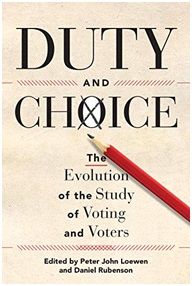 Abstract:Devoted to exploring elections as the central act in a democracy, Duty and Choice: The Evolution of the Study of Voting and Voters is animated by a set of three overarching questions: Why do some citizens vote while others do not? How do voters decide to cast their ballots for one candidate and not another? How does the context in which citizens live influence the choices they make? Organized into three sections focused on turnout, vote choice, and electoral systems, the volume seeks to provide novel insights into the most pressing questions for scholars of vote choice and voting behaviour. In addition to featuring several prominent Canadian scholars, the collection includes chapters by leading scholars from the United States and Europe. Abstract:Devoted to exploring elections as the central act in a democracy, Duty and Choice: The Evolution of the Study of Voting and Voters is animated by a set of three overarching questions: Why do some citizens vote while others do not? How do voters decide to cast their ballots for one candidate and not another? How does the context in which citizens live influence the choices they make? Organized into three sections focused on turnout, vote choice, and electoral systems, the volume seeks to provide novel insights into the most pressing questions for scholars of vote choice and voting behaviour. In addition to featuring several prominent Canadian scholars, the collection includes chapters by leading scholars from the United States and Europe. |
| 15. Indonesia, state and society in transition / Jemma Purdey, Antje Missbach and Dave Mcrae .- London: Lynne Rienner Publishers, 2020 |
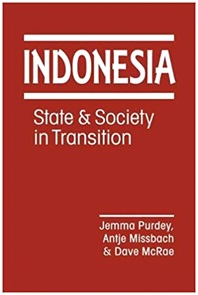 Abstract:Indonesia remains a country in transition even now, some two decades after its extraordinary shift from authoritarianism to democracy and from economic crisis to a rapidly growing economy. What explains the trajectory of that shift? What challenges does this island nation of 270 million people - with the world's largest Muslim population - face now, as the quality of democratic life erodes and it grapples with profound social and economic inequalities? Addressing these questions, the authors comprehensively explore the dynamics of Indonesia's politics, society, political economy, and culture, as well as its role in the international order. Abstract:Indonesia remains a country in transition even now, some two decades after its extraordinary shift from authoritarianism to democracy and from economic crisis to a rapidly growing economy. What explains the trajectory of that shift? What challenges does this island nation of 270 million people - with the world's largest Muslim population - face now, as the quality of democratic life erodes and it grapples with profound social and economic inequalities? Addressing these questions, the authors comprehensively explore the dynamics of Indonesia's politics, society, political economy, and culture, as well as its role in the international order. |
| 16. Making a world after empire, the bandung moment and its political afterlives / Christopher J. Lee .- America: Ohio University Press, 2019 |
 Abstract:In April 1955, twenty-nine countries from Africa, Asia, and the Middle East came together for a diplomatic conference in Bandung, Indonesia, intending to define the direction of the postcolonial world. Representing approximately two-thirds of the world's population, the Bandung conference occurred during a key moment of transition in the mid-twentieth century--amid the global wave of decolonization that took place after the Second World War and the nascent establishment of a new cold war world order. Conference participants such as Jawaharlal Nehru of India, Gamal Abdel Nasser of Egypt, Zhou Enlai of China, and President Sukarno of Indonesia seized this occasion of change to attempt the creation of a political alternative to the dual threats of Western neocolonialism and the cold war interventionism of the United States and the Soviet Union. Abstract:In April 1955, twenty-nine countries from Africa, Asia, and the Middle East came together for a diplomatic conference in Bandung, Indonesia, intending to define the direction of the postcolonial world. Representing approximately two-thirds of the world's population, the Bandung conference occurred during a key moment of transition in the mid-twentieth century--amid the global wave of decolonization that took place after the Second World War and the nascent establishment of a new cold war world order. Conference participants such as Jawaharlal Nehru of India, Gamal Abdel Nasser of Egypt, Zhou Enlai of China, and President Sukarno of Indonesia seized this occasion of change to attempt the creation of a political alternative to the dual threats of Western neocolonialism and the cold war interventionism of the United States and the Soviet Union. |
| 17. Terrorism and counter terrorism, A comprehensive introduction to actors and actions / Henry Prunckun &Troy Whitford .- London: Lynne Rienner Publishers, 2019 |
 Abstract: What is terrorism? How do terrorists operate?what are their means, targets, and motivations? How can governments prevent terrorist attacks from happening? The authors address these questions in their systematic, comprehensive exploration of terrorism and counterterrorism. Abstract: What is terrorism? How do terrorists operate?what are their means, targets, and motivations? How can governments prevent terrorist attacks from happening? The authors address these questions in their systematic, comprehensive exploration of terrorism and counterterrorism. |
| 18. The prison letters of Nelson Mandela / Sahm Venter .- New York: Norton, 2018 |
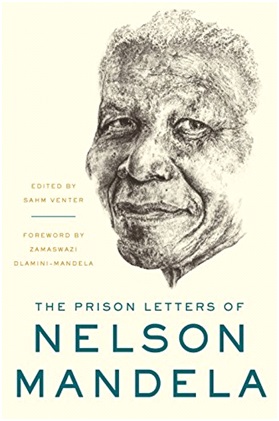 Abstract: One of NPR's Great Reads of 2018 An unforgettable portrait of one of the most inspiring historical figures of the twentieth century, published on the centenary of his birth. Arrested in 1962 as South Africa’s apartheid regime intensified its brutal campaign against political opponents, forty-four-year-old lawyer and African National Congress activist Nelson Mandela had no idea that he would spend the next twenty-seven years in jail. During his 10,052 days of incarceration, the future leader of South Africa wrote a multitude of letters to unyielding prison authorities, fellow activists, government officials, and, most memorably, to his courageous wife, Winnie, and his five children. Now, 255 of these letters, many of which have never been published, provide exceptional insight into how Mandela maintained his inner spirits while living in almost complete isolation, and how he engaged with an outside world that became increasingly outraged by his plight. Abstract: One of NPR's Great Reads of 2018 An unforgettable portrait of one of the most inspiring historical figures of the twentieth century, published on the centenary of his birth. Arrested in 1962 as South Africa’s apartheid regime intensified its brutal campaign against political opponents, forty-four-year-old lawyer and African National Congress activist Nelson Mandela had no idea that he would spend the next twenty-seven years in jail. During his 10,052 days of incarceration, the future leader of South Africa wrote a multitude of letters to unyielding prison authorities, fellow activists, government officials, and, most memorably, to his courageous wife, Winnie, and his five children. Now, 255 of these letters, many of which have never been published, provide exceptional insight into how Mandela maintained his inner spirits while living in almost complete isolation, and how he engaged with an outside world that became increasingly outraged by his plight. |
| 19. These Truths, a history of the united states / Jill Lepore .- London: Norton, 2018 |
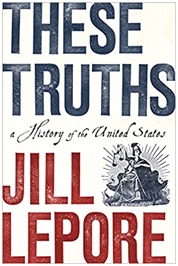 Abstract: These Truths tells this uniquely American story, beginning in 1492, asking whether the course of events over more than five centuries has proven the nation’s truths, or belied them. To answer that question, Lepore traces the intertwined histories of American politics, law, journalism, and technology, from the colonial town meeting to the nineteenth-century party machine, from talk radio to twenty-first-century Internet polls, from Magna Carta to the Patriot Act, from the printing press to Facebook News. Abstract: These Truths tells this uniquely American story, beginning in 1492, asking whether the course of events over more than five centuries has proven the nation’s truths, or belied them. To answer that question, Lepore traces the intertwined histories of American politics, law, journalism, and technology, from the colonial town meeting to the nineteenth-century party machine, from talk radio to twenty-first-century Internet polls, from Magna Carta to the Patriot Act, from the printing press to Facebook News. |
| 20. World politics, interests, interactions, institutions / Frieden Lake Schultz .- New York: Norton, 2019 |
 Abstract: Why are there wars? Why do countries struggle to cooperate to prevent genocides or to protect the environment? Why are some countries rich while others are poor? Organized around the puzzles that draw scholars and students alike to the study of international relations, World Politics gives students the tools they need to think analytically about the fields most compelling questions. Abstract: Why are there wars? Why do countries struggle to cooperate to prevent genocides or to protect the environment? Why are some countries rich while others are poor? Organized around the puzzles that draw scholars and students alike to the study of international relations, World Politics gives students the tools they need to think analytically about the fields most compelling questions. |
| 21. Citizenship in times of Turmoil; Theory, practice and policy / Devyani Prabhat .- USA: Edward Elgar, 2019 |
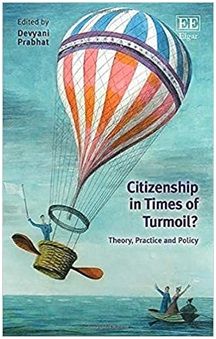 Abstract: This innovative book considers the evolution of the contemporary issues surrounding British citizenship, integrating the social aspects and ideas of identity and belonging alongside its legal elements. With contributions from renowned lawyers and academics, it challenges the view that there are immutable values and enduring rights associated with citizenship status. The book is organised into three thematic parts. Expert contributors trace the life cycle of the citizenship process, focusing on becoming a British citizen, retaining this citizenship with its associated rights, and the potential loss of citizenship owing to immigration controls. Abstract: This innovative book considers the evolution of the contemporary issues surrounding British citizenship, integrating the social aspects and ideas of identity and belonging alongside its legal elements. With contributions from renowned lawyers and academics, it challenges the view that there are immutable values and enduring rights associated with citizenship status. The book is organised into three thematic parts. Expert contributors trace the life cycle of the citizenship process, focusing on becoming a British citizen, retaining this citizenship with its associated rights, and the potential loss of citizenship owing to immigration controls. |
| 22. New Development in Islamic economics; examples from Southeast Asia / Asmak Rahman .- UK: Emerald, 2019 |
 Abstract: New Developments in Islamic Economics: Examples from Southeast Asia investigates the latest developments in a vibrant and fast-moving area of practical financial and economic study. Primarily focused on Malaysian contexts, while also presenting perspectives from Indonesia and Thailand, this book examines the Asian nations leading the world in the application of Islamic finance. Case studies analyse and discuss new and emerging issues in Islamic economics, including microtakaful, waqf, social finance and poverty alleviation from an Islamic perspective. Abstract: New Developments in Islamic Economics: Examples from Southeast Asia investigates the latest developments in a vibrant and fast-moving area of practical financial and economic study. Primarily focused on Malaysian contexts, while also presenting perspectives from Indonesia and Thailand, this book examines the Asian nations leading the world in the application of Islamic finance. Case studies analyse and discuss new and emerging issues in Islamic economics, including microtakaful, waqf, social finance and poverty alleviation from an Islamic perspective. |
| 23 . Oil men, territorial ambitions and political agents: from pearls to oil in the trucial states of the Gulf - 2 / David Heard .- Germany: Gerlach Press, 2019 |
 Abstract: “ Oil Men" represents a unique resource for the student of the challenges, both physical and political, of oil prospecting in a region with no infrastructure and no formal boundaries between local power bases. The book charts the slow and unexpected transformation of the emirates from poverty to undreamed-of wealth. Detailed coverage with extensive access to primary sources describes the frequently tortuous negotiations between oil companies, sheikhs and regional political agents, all of whom sought to protect their different vested interests. Abstract: “ Oil Men" represents a unique resource for the student of the challenges, both physical and political, of oil prospecting in a region with no infrastructure and no formal boundaries between local power bases. The book charts the slow and unexpected transformation of the emirates from poverty to undreamed-of wealth. Detailed coverage with extensive access to primary sources describes the frequently tortuous negotiations between oil companies, sheikhs and regional political agents, all of whom sought to protect their different vested interests. |
| 24. The ecosystem approach in international environmental law; Genealogy and Biopolitics / Vito De Lucia .- New York: Routledge, 2019 |
 Abstract: The ecosystem approach, broadly understood as a legal and governance strategy for integrated environmental and biodiversity management, has been adopted within a wide variety of international environmental legal regimes and provides a narrative, a policy approach and in some cases legally binding obligations for States to implement what has been called a ‘new paradigm’ of environmental management. In this last respect, the ecosystem approach is also often considered to offer an opportunity to move beyond the outdated anthropocentric framework underpinning much of international environmental law, thus helping re-think law in the Anthropocene. Abstract: The ecosystem approach, broadly understood as a legal and governance strategy for integrated environmental and biodiversity management, has been adopted within a wide variety of international environmental legal regimes and provides a narrative, a policy approach and in some cases legally binding obligations for States to implement what has been called a ‘new paradigm’ of environmental management. In this last respect, the ecosystem approach is also often considered to offer an opportunity to move beyond the outdated anthropocentric framework underpinning much of international environmental law, thus helping re-think law in the Anthropocene. |
| 25. The united states and the Iranian nuclear programme: A critical history / Steven Hurst .- UK: Edinburgh University Press, 2018 |
 Abstract: A critical overview of American efforts to prevent Iran from building nuclear weapons, from the 1950s to the present Steven Hurst traces the development of the Iranian nuclear weapon crisis across its historical context: from the conception of Iran's nuclear programme under the Shah to the signing of the Joint Comprehensive Plan of Action in 2015. Emphasising the centrality of domestic politics in decision-making on both sides, Hurst adopts a broader perspective on the Iranian nuclear programme and explains the continued failure of the USA to halt it. He reveals how President Obama's alterations to the American strategy, accompanied by shifts in Iranian domestic politics, finally brought about a resolution. Abstract: A critical overview of American efforts to prevent Iran from building nuclear weapons, from the 1950s to the present Steven Hurst traces the development of the Iranian nuclear weapon crisis across its historical context: from the conception of Iran's nuclear programme under the Shah to the signing of the Joint Comprehensive Plan of Action in 2015. Emphasising the centrality of domestic politics in decision-making on both sides, Hurst adopts a broader perspective on the Iranian nuclear programme and explains the continued failure of the USA to halt it. He reveals how President Obama's alterations to the American strategy, accompanied by shifts in Iranian domestic politics, finally brought about a resolution. |
| 26. China's cultural diplomacy ; A Great Leap outward? / Xin Liu .- New York: Routledge, 2020 |
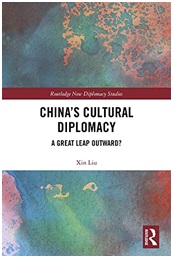 Abstract: The volume presents an alternative analytical framework to examine China’s cultural diplomacy, which goes beyond the Western-defined concept of ‘soft power’ that prevails in the current literature. This new approach constructs a three-dimensional framework on Orientalism, cultural hegemony and nationalism to decipher the multiple contexts, which China inhabits historically, internationally and domestically. The book presents multiple case studies of the Confucius Institute, and compares the global programme located around the world with its Western counterparts, and also with other Chinese government-sponsored endeavours and non-government-initiated programmes. The author aims to solve the puzzle of why China’s efforts in cultural diplomacy are perceived differently around the world and helps to outline the distinctive features of China’s cultural diplomacy. Abstract: The volume presents an alternative analytical framework to examine China’s cultural diplomacy, which goes beyond the Western-defined concept of ‘soft power’ that prevails in the current literature. This new approach constructs a three-dimensional framework on Orientalism, cultural hegemony and nationalism to decipher the multiple contexts, which China inhabits historically, internationally and domestically. The book presents multiple case studies of the Confucius Institute, and compares the global programme located around the world with its Western counterparts, and also with other Chinese government-sponsored endeavours and non-government-initiated programmes. The author aims to solve the puzzle of why China’s efforts in cultural diplomacy are perceived differently around the world and helps to outline the distinctive features of China’s cultural diplomacy. |
| 27. Debating and defining borders ; Philosophical and theoretical perspectives / Anthony cooper .- New York: routledge, 2020 |
 Abstract: This book brings together insights from border scholars and philosophers to ask how we are to define and understand concepts of borders today. Borders have a defining role in contemporary societies. Take, for example, the 2016 US election and the UK Brexit referendum, and subsequent debate, where the rhetoric and symbolism of border controls proved fundamental to the outcomes. However, borders are also becoming ever more multifaceted and complex, representing intersections of political, economical, social, and cultural interests. For some, borders are tangible, situated in time and place; for others, the nature of borders can be abstracted and discussed in general terms Abstract: This book brings together insights from border scholars and philosophers to ask how we are to define and understand concepts of borders today. Borders have a defining role in contemporary societies. Take, for example, the 2016 US election and the UK Brexit referendum, and subsequent debate, where the rhetoric and symbolism of border controls proved fundamental to the outcomes. However, borders are also becoming ever more multifaceted and complex, representing intersections of political, economical, social, and cultural interests. For some, borders are tangible, situated in time and place; for others, the nature of borders can be abstracted and discussed in general terms |
| 28. Democracy and unity in India; understanding the all India phenomenon, 1940-1960 / Emily Rook-Koepsel .- New York, 2019 |
 Abstract: This book analyzes the ways in which organizations and individuals in India grappled with and contested definitions of democracy and unity in the decades directly preceding and following independent Indian statehood. The All India Scheduled Castes Federation and the All India Women’s Conference are used as case studies to explore Indian Dalit and women activists’ attempts to reconceptualize universal citizenship, Indian identity, dissent, and principled democracy during a moment of uncertainty in India’s political life. The author argues that, because the Indian nation and the Indian state remained in flux during the 1940s and '50s, marginal political actors, writers, social activists, and others were able to propose novel forms of democratic participation and new ideas about what it would mean to be a unified state that appreciates political responsibility, a respect for difference and a broader perspective of the population. Abstract: This book analyzes the ways in which organizations and individuals in India grappled with and contested definitions of democracy and unity in the decades directly preceding and following independent Indian statehood. The All India Scheduled Castes Federation and the All India Women’s Conference are used as case studies to explore Indian Dalit and women activists’ attempts to reconceptualize universal citizenship, Indian identity, dissent, and principled democracy during a moment of uncertainty in India’s political life. The author argues that, because the Indian nation and the Indian state remained in flux during the 1940s and '50s, marginal political actors, writers, social activists, and others were able to propose novel forms of democratic participation and new ideas about what it would mean to be a unified state that appreciates political responsibility, a respect for difference and a broader perspective of the population. |
| 29. EU-Japan security cooperation; Trends and prospects / Emil kirchner .- new york: routledge, 2019 |
 Abstract: This book assesses EU-Japan security relations, examining how they have developed in individual security sectors and how they could be affected by international developments. The conclusions of the Economic Partnership Agreement and the Strategic Partnership Agreement in 2017 demonstrate the steady growth in EU-Japan political relations. Since the 1990s, dialogues between the EU and Japan have benefitted from extensive trade and investment ties and shared liberal values. Based on collaborative research by European and Japanese scholars, this book provides an in-depth, systematic and comparative analysis of the extent to which the EU and Japan have achieved concrete actions in the pursuance of security cooperation across a range of key areas such as nuclear proliferation, regional security, international terrorism, and energy and climate security. Abstract: This book assesses EU-Japan security relations, examining how they have developed in individual security sectors and how they could be affected by international developments. The conclusions of the Economic Partnership Agreement and the Strategic Partnership Agreement in 2017 demonstrate the steady growth in EU-Japan political relations. Since the 1990s, dialogues between the EU and Japan have benefitted from extensive trade and investment ties and shared liberal values. Based on collaborative research by European and Japanese scholars, this book provides an in-depth, systematic and comparative analysis of the extent to which the EU and Japan have achieved concrete actions in the pursuance of security cooperation across a range of key areas such as nuclear proliferation, regional security, international terrorism, and energy and climate security. |
| 30. Extraterritoriality and international bribery ; A Collective Action perspective / Branislav Hock .- New York: Routledge, 2020 |
 Abstract: The book presents a collective action perspective to explain how extraterritoriality functions and assess when, and to what extent, extraterritoriality is effective. A collective action perspective provides a new account of foreign anti-bribery laws and their extraterritorial enforcement that draws on theories discussed in the field of economic governance. Within this framework, the book offers an intensive analysis of US foreign anti-bribery law such as the Foreign Corrupt Practices Act (FCPA), international law as it emanates from the OECD Anti-Bribery Convention, and comparative insights into UK law and German law. To test the theory in practice, the book provides a unique data set of more than 40 foreign anti-bribery enforcement actions conducted by the US Department of Justice (DOJ) and the Securities and Exchange Commission (SEC), and other examples from comparative jurisdictions. Abstract: The book presents a collective action perspective to explain how extraterritoriality functions and assess when, and to what extent, extraterritoriality is effective. A collective action perspective provides a new account of foreign anti-bribery laws and their extraterritorial enforcement that draws on theories discussed in the field of economic governance. Within this framework, the book offers an intensive analysis of US foreign anti-bribery law such as the Foreign Corrupt Practices Act (FCPA), international law as it emanates from the OECD Anti-Bribery Convention, and comparative insights into UK law and German law. To test the theory in practice, the book provides a unique data set of more than 40 foreign anti-bribery enforcement actions conducted by the US Department of Justice (DOJ) and the Securities and Exchange Commission (SEC), and other examples from comparative jurisdictions. |
| 31. India AT 70 Multidisciplinary approaches / Ruth Maxey and Paul McGarr .- new york: Routledge, 2020 |
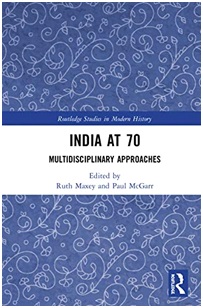 Abstract: The book examines Indian independence in August 1947 and its multiple afterlives. With nine contributions by a range of international scholars, it interrogates 1947 and its complex, bloody aftermath in historical, political and aesthetic terms. This original collection conceives of Indian independence in bold and innovative ways by moving across national boundaries and disciplinary, geopolitical and linguistic landscapes; and by examining a wealth of under-researched primary material, both recent and historical. India at 70 is a unique and indispensable contribution to Indian history, literary and cultural studies. Abstract: The book examines Indian independence in August 1947 and its multiple afterlives. With nine contributions by a range of international scholars, it interrogates 1947 and its complex, bloody aftermath in historical, political and aesthetic terms. This original collection conceives of Indian independence in bold and innovative ways by moving across national boundaries and disciplinary, geopolitical and linguistic landscapes; and by examining a wealth of under-researched primary material, both recent and historical. India at 70 is a unique and indispensable contribution to Indian history, literary and cultural studies. |
| 32. India's Maritime Strategy ; Balancing Regional Ambitions and China / Shishir Upadhyaya .- New York: Routledge, 2020 |
 Abstract: The first book by a former Indian naval intelligence officer on Sino-India relations, India’s Maritime Strategy provides a unique insight into the Indian Navy, tracing its post-independence growth and discussing its transformation and future in the 21st century. In the context of the rise of China’s maritime power in the Indian Ocean, this book provides a nuanced view of the extent and scope of India’s maritime reach and the effect of this on Sino-Indian competition. Challenging the view that by developing a favourable environment alone, India could seek to maintain its balance of power with China, it is argued that despite durable bilateral security ties with most regional states, India’s maritime aspirations to be the primary net security provider for the region are unsustainable in the long term. Abstract: The first book by a former Indian naval intelligence officer on Sino-India relations, India’s Maritime Strategy provides a unique insight into the Indian Navy, tracing its post-independence growth and discussing its transformation and future in the 21st century. In the context of the rise of China’s maritime power in the Indian Ocean, this book provides a nuanced view of the extent and scope of India’s maritime reach and the effect of this on Sino-Indian competition. Challenging the view that by developing a favourable environment alone, India could seek to maintain its balance of power with China, it is argued that despite durable bilateral security ties with most regional states, India’s maritime aspirations to be the primary net security provider for the region are unsustainable in the long term. |
| 33. Islam in International Relations; politics and paradigms / Nassef Manabilang Adiong, Raffaele Mauriello and Deina Abdelkader .- New York: Routledge, 2019 |
 Abstract: The book analyses the interaction between Islam and IR. It shows how Islam is a conceptualization of ideas that affect people’s thinking and behaviour in their capacity to relate with IR as both discipline and practice. This approach challenges Western-based and defined epistemological and ontological foundations of the discipline, and by doing so contributes to worlding IR as a field of study and practice by presenting and discussing a broad range of standpoints from within Islamic civilization. The volume opens with the presentation and discussion of the international thought of a major Muslim leader, followed by a chapter that addresses the ethical practice of IR, from traditional pacifism to modern Arab political philosophy. Abstract: The book analyses the interaction between Islam and IR. It shows how Islam is a conceptualization of ideas that affect people’s thinking and behaviour in their capacity to relate with IR as both discipline and practice. This approach challenges Western-based and defined epistemological and ontological foundations of the discipline, and by doing so contributes to worlding IR as a field of study and practice by presenting and discussing a broad range of standpoints from within Islamic civilization. The volume opens with the presentation and discussion of the international thought of a major Muslim leader, followed by a chapter that addresses the ethical practice of IR, from traditional pacifism to modern Arab political philosophy. |
| 34. Middle class, civil society and democracy in asia / Hsin-Huang Michael Hsiao .- New york: Routledge, 2019 |
 Abstract: This book offers a timely analysis of the tripartite links between the middle class, civil society and democratic experiences in Northeast and Southeast Asia. It aims to go beyond the two popular theoretical propositions in current democratic theory, which emphasise the bilateral connections between the middle class and democracy on one hand and civil society and democracy on the other. Instead, using national case studies, this volume attempts to provide a new comparative typological interpretation of the triple relationship in Taiwan, South Korea, the Philippines, Indonesia and Thailand. Presenting a careful analysis and delineation of historical democratic transformation over the past thirty years, three discernible typologies emerge. Namely, there are positive links in Taiwan and South Korea, dubious links in the Philippines and Indonesia, and negative links in Thailand. Abstract: This book offers a timely analysis of the tripartite links between the middle class, civil society and democratic experiences in Northeast and Southeast Asia. It aims to go beyond the two popular theoretical propositions in current democratic theory, which emphasise the bilateral connections between the middle class and democracy on one hand and civil society and democracy on the other. Instead, using national case studies, this volume attempts to provide a new comparative typological interpretation of the triple relationship in Taiwan, South Korea, the Philippines, Indonesia and Thailand. Presenting a careful analysis and delineation of historical democratic transformation over the past thirty years, three discernible typologies emerge. Namely, there are positive links in Taiwan and South Korea, dubious links in the Philippines and Indonesia, and negative links in Thailand. |
| 35. Naval diplomacy in the 21st century; a model for the post-cold war global order / Kevin Rowlands .- New York: Routledge, 2019 |
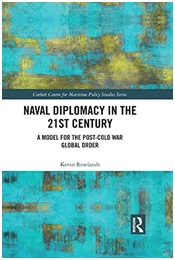 Abstract: This book offers a detailed investigation of naval diplomacy, past and present, and challenges the widely accepted Anglo-American school of sea power thought. Despite the acknowledgement of the importance of the threat or use of force in the pursuit of policy since the dawn of strategic thought, the utility of seapower in operations other than war is poorly understood and articulated. Theorists have invariably viewed seapower in peacetime through the lens of hard power effects such as coercion and deterrence. Commentaries on engagement, interoperability and the forging of friendships are largely conspicuous by their absence. This book considers how all these strands of international politics can be better understood for use in the 21st century. Abstract: This book offers a detailed investigation of naval diplomacy, past and present, and challenges the widely accepted Anglo-American school of sea power thought. Despite the acknowledgement of the importance of the threat or use of force in the pursuit of policy since the dawn of strategic thought, the utility of seapower in operations other than war is poorly understood and articulated. Theorists have invariably viewed seapower in peacetime through the lens of hard power effects such as coercion and deterrence. Commentaries on engagement, interoperability and the forging of friendships are largely conspicuous by their absence. This book considers how all these strands of international politics can be better understood for use in the 21st century. |
| 36. Negotiations in the World Trade organizations ; Design and performance / Michal Parizek .- New york: Routledge, 2020 |
 Abstract: This book examines the World Trade Organization (WTO) in the context of the global economy in the twenty-first century, arguing that many problems within the institution lie in the disparity between its design and the nature of its tasks. Studying the global trade regime and the unsuccessful Doha round of trade liberalization negotiations, this volume suggests that important institutional adjustments may be necessary for the WTO and other major international institutions to (re-)gain their ability to manage global economy.. Abstract: This book examines the World Trade Organization (WTO) in the context of the global economy in the twenty-first century, arguing that many problems within the institution lie in the disparity between its design and the nature of its tasks. Studying the global trade regime and the unsuccessful Doha round of trade liberalization negotiations, this volume suggests that important institutional adjustments may be necessary for the WTO and other major international institutions to (re-)gain their ability to manage global economy.. |
| 37. North Korea - US relations / Ramon Pacheco Pardo .- New york: Routledge, 2020 |
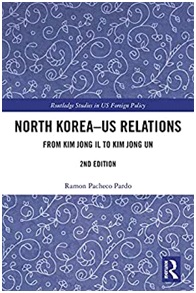 Abstract: How has North Korea sought to normalize diplomatic relations with the US? Explaining the continuities between the Kim Jong-un and Kim Jong-il governments, as well as the discontinuities, especially the decisive move towards brinkmanship under Kim Jong-un culminating in 2017 and subsequent turn towards diplomacy, this book shows how North Korea has constantly learnt from its own experience and the experience of others to evolve and adapt its policy towards the US. This fully revised and expanded second edition draws on interviews and conversations with American, North and South Korean, Chinese and other countries’ policy-makers and experts and North Korean official media stories. It has been updated to include discussion of the post-2012 period when Kim Jong-un replaced his father to become the leader of North Korea, and provides detailed analysis of both presidencies, concluding with a study of the two bilateral summits held with President Donald Trump. Abstract: How has North Korea sought to normalize diplomatic relations with the US? Explaining the continuities between the Kim Jong-un and Kim Jong-il governments, as well as the discontinuities, especially the decisive move towards brinkmanship under Kim Jong-un culminating in 2017 and subsequent turn towards diplomacy, this book shows how North Korea has constantly learnt from its own experience and the experience of others to evolve and adapt its policy towards the US. This fully revised and expanded second edition draws on interviews and conversations with American, North and South Korean, Chinese and other countries’ policy-makers and experts and North Korean official media stories. It has been updated to include discussion of the post-2012 period when Kim Jong-un replaced his father to become the leader of North Korea, and provides detailed analysis of both presidencies, concluding with a study of the two bilateral summits held with President Donald Trump. |
| 38. Northeast India and India's Act East policy / M. Amarjeet Singh .- New york: Routledge, 2020 |
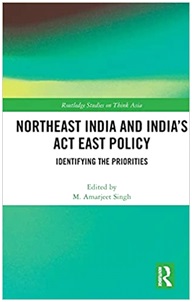 Abstract: This book offers an understanding of the expectations and challenges of Northeast India in the context of India's Act East policy. It critically examines how the policy is being pursued by the incumbent Bharatiya Janata Party-led central government and analyses its relevance from local perspectives. Contributors to the book provide an examination of the differences between Look East and Act East policy and explanations of the expectations of India's neighboring countries, particularly Myanmar, towards Northeast India. Abstract: This book offers an understanding of the expectations and challenges of Northeast India in the context of India's Act East policy. It critically examines how the policy is being pursued by the incumbent Bharatiya Janata Party-led central government and analyses its relevance from local perspectives. Contributors to the book provide an examination of the differences between Look East and Act East policy and explanations of the expectations of India's neighboring countries, particularly Myanmar, towards Northeast India. |
| 39. Nuclear deterrence in south asia; new technologies and challenges to sustainable peace / Rizwana Abbasi and Zafar Khan .- new york: Routledge, 2020 |
 Abstract: This book explores evolving patterns of nuclear deterrence, the impact of new technologies, and changing deterrent force postures in the South Asian region to assess future challenges for sustainable peace and stability. Under the core principles of the security dilemma, this book analyzes the prevailing security environment in South Asia and offers unilateral, bilateral, and multilateral frameworks to stabilize peace and ensure deterrence stability in the South Asian region. Moreover, contending patterns of deterrence dynamics in the South Asian region are further elaborated as becoming inextricably interlinked with the broader security dynamics of the Asia-Pacific region and the interactions with the United States and China’s Belt and Road Initiative. Abstract: This book explores evolving patterns of nuclear deterrence, the impact of new technologies, and changing deterrent force postures in the South Asian region to assess future challenges for sustainable peace and stability. Under the core principles of the security dilemma, this book analyzes the prevailing security environment in South Asia and offers unilateral, bilateral, and multilateral frameworks to stabilize peace and ensure deterrence stability in the South Asian region. Moreover, contending patterns of deterrence dynamics in the South Asian region are further elaborated as becoming inextricably interlinked with the broader security dynamics of the Asia-Pacific region and the interactions with the United States and China’s Belt and Road Initiative. |
| 40. Organized Crime andand corruption across borders; exploring the belt and road intiative / T. Wing Lo .- new york: Routledge, 2020 |
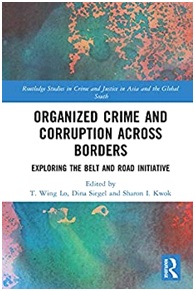 Abstract: This book explores China’s Belt and Road Initiative and the criminogenic potential for economic, financial, and socio-cultural cooperation across countries, where some are known for weak law enforcement and high levels of corruption. It examines whether these flows of capital are increasing the amount of organized crime in the newly linked regions and how law enforcement agencies are responding. Bringing together experts across the Global South and Europe, this book considers transnational organized crime and corruption across One Belt One Road (OBOR). It examines crime and corruption in China and its international United Front tactic; analyzes various forms of transnational organized crime such as trafficking of illegal drugs, looted antiquities, and wildlife and counterfeit products; and presents studies on corruption and organized crime in selected OBOR countries including Russia, Kazakhstan, Lithuania, Czech Republic, Poland, and Bangladesh. Abstract: This book explores China’s Belt and Road Initiative and the criminogenic potential for economic, financial, and socio-cultural cooperation across countries, where some are known for weak law enforcement and high levels of corruption. It examines whether these flows of capital are increasing the amount of organized crime in the newly linked regions and how law enforcement agencies are responding. Bringing together experts across the Global South and Europe, this book considers transnational organized crime and corruption across One Belt One Road (OBOR). It examines crime and corruption in China and its international United Front tactic; analyzes various forms of transnational organized crime such as trafficking of illegal drugs, looted antiquities, and wildlife and counterfeit products; and presents studies on corruption and organized crime in selected OBOR countries including Russia, Kazakhstan, Lithuania, Czech Republic, Poland, and Bangladesh. |
| 41. Politics in developing counties / Damien Kingsbury .- New York: Routledge, 2019 |
 Abstract: Politics in Developing Countries provides a clear and reader-friendly introduction to the key factors and themes that shape political processes in developing countries. Achieving development outcomes such as reducing poverty and inequality is only possible through efficient governance, well-planned policies and careful allocation of resources, but often politics in developing countries has been identified with mismanagement, corruption, conflict and repression of dissent. This book assesses the politics of developing countries in the period since decolonisation, focusing on the ways in which states have or have not worked to the advancement of their citizens’ interests. Abstract: Politics in Developing Countries provides a clear and reader-friendly introduction to the key factors and themes that shape political processes in developing countries. Achieving development outcomes such as reducing poverty and inequality is only possible through efficient governance, well-planned policies and careful allocation of resources, but often politics in developing countries has been identified with mismanagement, corruption, conflict and repression of dissent. This book assesses the politics of developing countries in the period since decolonisation, focusing on the ways in which states have or have not worked to the advancement of their citizens’ interests. |
| 42. Religion and nationalism in asia / Giorgio Shani and Takashi Kibe .- New York: Routledge, 2020 |
 Abstract: This book re-examines the relationship between religion and nationalism in a contemporary Asian context, with a focus on East, South and South East Asia. Addressing empirical, analytical, and normative questions, it analyses selected case studies from across Asia, including China, India, Iraq, Japan, Pakistan, the Philippines and Sri Lanka and compares the differences and commonalities between the diverse configurations of nationalism and religion across the continent. It then goes on to explain reasons for the regional religious resurgence and asks, is the nation-state model, aligned with secularism, suitable for the region? Exploring the two interrelated issues of legacies and possibilities, this book also examines the relationship between nationalism and modernity, identifying possible and desirable trajectories which go beyond existing configurations of nationalism and religion. Abstract: This book re-examines the relationship between religion and nationalism in a contemporary Asian context, with a focus on East, South and South East Asia. Addressing empirical, analytical, and normative questions, it analyses selected case studies from across Asia, including China, India, Iraq, Japan, Pakistan, the Philippines and Sri Lanka and compares the differences and commonalities between the diverse configurations of nationalism and religion across the continent. It then goes on to explain reasons for the regional religious resurgence and asks, is the nation-state model, aligned with secularism, suitable for the region? Exploring the two interrelated issues of legacies and possibilities, this book also examines the relationship between nationalism and modernity, identifying possible and desirable trajectories which go beyond existing configurations of nationalism and religion. |
| 43. Routledge companion to peace and conflict studies / Sean Byrne .- New York: Routledge, 2020 |
 Abstract: This Companion examines contemporary challenges in Peace and Conflict Studies (PACS) and offers practical solutions to these problems. Bringing together chapters from new and established global scholars, the volume explores and critiques the foundations of Peace and Conflict Studies in an effort to advance the discipline in light of contemporary local and global actors. It argues that new critical and emancipatory peacebuilding and conflict transformation strategies are needed to address the complex cultural, economic, political, and social conflicts of the 21st century. Abstract: This Companion examines contemporary challenges in Peace and Conflict Studies (PACS) and offers practical solutions to these problems. Bringing together chapters from new and established global scholars, the volume explores and critiques the foundations of Peace and Conflict Studies in an effort to advance the discipline in light of contemporary local and global actors. It argues that new critical and emancipatory peacebuilding and conflict transformation strategies are needed to address the complex cultural, economic, political, and social conflicts of the 21st century. |
| 44. Routledge handbook of civil society in Asia / Akihiro Ogawa .- New York: Routledge, 2018 |
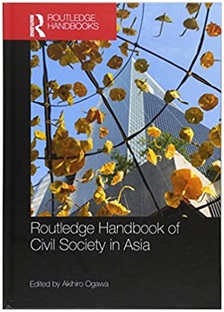 Abstract: The Routledge Handbook of Civil Society in Asia is an interdisciplinary resource, covering one of the most dynamically expanding sectors in contemporary Asia. Originally a product of Western thinking, civil society represents a particular set of relationships between the state and either society or the individual. Each culture, however, molds its own version of civil society, reflecting its most important values and traditions. This handbook provides a comprehensive survey of the directions and nuances of civil society, featuring contributions by leading specialists on Asian society from the fields of political science, sociology, anthropology, and other disciplines. Abstract: The Routledge Handbook of Civil Society in Asia is an interdisciplinary resource, covering one of the most dynamically expanding sectors in contemporary Asia. Originally a product of Western thinking, civil society represents a particular set of relationships between the state and either society or the individual. Each culture, however, molds its own version of civil society, reflecting its most important values and traditions. This handbook provides a comprehensive survey of the directions and nuances of civil society, featuring contributions by leading specialists on Asian society from the fields of political science, sociology, anthropology, and other disciplines. |
| 45. Routledge handbook of diaspora studies by Cohen Robin |
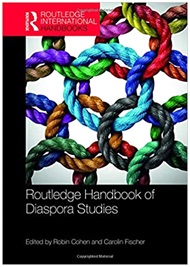 Abstract: The word ‘diaspora’ has leapt from its previously confined use – mainly concerned with the dispersion of Jews, Greeks, Armenians and Africans away from their natal homelands – to cover the cases of many other ethnic groups, nationalities and religions. But this ‘horizontal’ scattering of the word to cover the mobility of many groups to many destinations, has been paralleled also by ‘vertical’ leaps, with the word diaspora being deployed to cover more and more phenomena and serve more and more objectives of different actors. With sections on ‘debating the concept’, ‘complexity’, ‘home and home-making’, ‘connections’ and ‘critiques’, the Routledge Handbook of Diaspora Studies is likely to remain an authoritative reference for some time. Abstract: The word ‘diaspora’ has leapt from its previously confined use – mainly concerned with the dispersion of Jews, Greeks, Armenians and Africans away from their natal homelands – to cover the cases of many other ethnic groups, nationalities and religions. But this ‘horizontal’ scattering of the word to cover the mobility of many groups to many destinations, has been paralleled also by ‘vertical’ leaps, with the word diaspora being deployed to cover more and more phenomena and serve more and more objectives of different actors. With sections on ‘debating the concept’, ‘complexity’, ‘home and home-making’, ‘connections’ and ‘critiques’, the Routledge Handbook of Diaspora Studies is likely to remain an authoritative reference for some time. |
| 46. Routledge handbook of energy economics / Ugur Soytas .- new york: Routledge, 2020 |
 Abstract: As an essential component for economic growth, energy has a significant impact on the global economy. The need to meet growing energy demand has prompted cutting-edge innovation in clean technology in an attempt to realise environmental and cost objectives, whilst ensuring the security of energy supply. This Handbook offers a comprehensive review of the economics of energy, including contributions from a distinguished array of international specialists. It provides a thorough discussion of the major research issues in this topical field of economics. Abstract: As an essential component for economic growth, energy has a significant impact on the global economy. The need to meet growing energy demand has prompted cutting-edge innovation in clean technology in an attempt to realise environmental and cost objectives, whilst ensuring the security of energy supply. This Handbook offers a comprehensive review of the economics of energy, including contributions from a distinguished array of international specialists. It provides a thorough discussion of the major research issues in this topical field of economics. |
| 47. Routledge handbook of ethics and International Relations / Brent J. Steele and Eric A. Heinze .- New York: Routledge, 2018 |
 Abstract: Ethics and international Relations (IR), once considered along the margins of the IR field, has emerged as one of the most eclectic and interdisciplinary research areas today. Yet the same diversity that enriches this field also makes it a difficult one to characterize. Is it, or should it only be, the social-scientific pursuit of explaining and understanding how ethics influences the behaviours of actors in international relations? Or, should it be a field characterized by what the world should be like, based on philosophical, normative and policy-based arguments? This Handbook suggests that it can actually be both, as the contributions contained therein demonstrate how those two conceptions of ethics and international relations are inherently linked. Abstract: Ethics and international Relations (IR), once considered along the margins of the IR field, has emerged as one of the most eclectic and interdisciplinary research areas today. Yet the same diversity that enriches this field also makes it a difficult one to characterize. Is it, or should it only be, the social-scientific pursuit of explaining and understanding how ethics influences the behaviours of actors in international relations? Or, should it be a field characterized by what the world should be like, based on philosophical, normative and policy-based arguments? This Handbook suggests that it can actually be both, as the contributions contained therein demonstrate how those two conceptions of ethics and international relations are inherently linked. |
| 48. Routledge handbook of global populism / Carlos de la Torre .- New York: Routledge, 2019 |
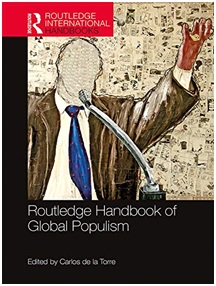 Abstract: This volume illustrates the diversity of populism globally. When seeking power, populists politicize issues, and point to problems that need to be addressed such as inequalities, the loss of national sovereignty to globalization, or the rule of unresponsive political elites. Yet their solutions tend to be problematic, simplistic, and in most instances, instead of leading to better forms of democracy, their outcomes are authoritarian. Populists use a playbook of concentrating power in the hands of the president, using the legal system instrumentally to punish critics, and attacking the media and civil society. Despite promising to empower the people, populists lead to processes of democratic erosion and even transform malfunctioning democracies into hybrid regimes. Abstract: This volume illustrates the diversity of populism globally. When seeking power, populists politicize issues, and point to problems that need to be addressed such as inequalities, the loss of national sovereignty to globalization, or the rule of unresponsive political elites. Yet their solutions tend to be problematic, simplistic, and in most instances, instead of leading to better forms of democracy, their outcomes are authoritarian. Populists use a playbook of concentrating power in the hands of the president, using the legal system instrumentally to punish critics, and attacking the media and civil society. Despite promising to empower the people, populists lead to processes of democratic erosion and even transform malfunctioning democracies into hybrid regimes. |
| 49. Routledge handbook of human rights and disasters / Flavia Zorzi Giustinia ni, Emanuele Sommario, Federco Casolari and Giulio Bartolini .- New York: Routledge, 2018 |
 Abstract: The Routledge Handbook of Human Rights and Disasters provides the first comprehensive review of the role played by international human rights law in the prevention and management of natural and technological disasters. Each chapter is written by a leading expert and offers a state-of-the-art overview of a significant topic within the field. In addition to focussing on the role of human rights obligations in disaster preparedness and response, the volume offers a broader perspective by examining how human rights law interacts with other legal regimes and by addressing the challenges facing humanitarian organizations. Abstract: The Routledge Handbook of Human Rights and Disasters provides the first comprehensive review of the role played by international human rights law in the prevention and management of natural and technological disasters. Each chapter is written by a leading expert and offers a state-of-the-art overview of a significant topic within the field. In addition to focussing on the role of human rights obligations in disaster preparedness and response, the volume offers a broader perspective by examining how human rights law interacts with other legal regimes and by addressing the challenges facing humanitarian organizations. |
| 50. Routledge handbook of human rights in Asia / Fernand de varennes and Christie M. Gardiner .- New York: Routledge, 2019 |
 Abstract: The Routledge Handbook of Human Rights in Asia provides a rich study of human rights challenges facing some of the most vulnerable people in Asia. While formal accession to core international human rights instruments is commonplace across the region, the realisation of human rights for many remains elusive as development pressure, violent conflict, limited political will and discrimination maintain human rights volatility. Abstract: The Routledge Handbook of Human Rights in Asia provides a rich study of human rights challenges facing some of the most vulnerable people in Asia. While formal accession to core international human rights instruments is commonplace across the region, the realisation of human rights for many remains elusive as development pressure, violent conflict, limited political will and discrimination maintain human rights volatility. |